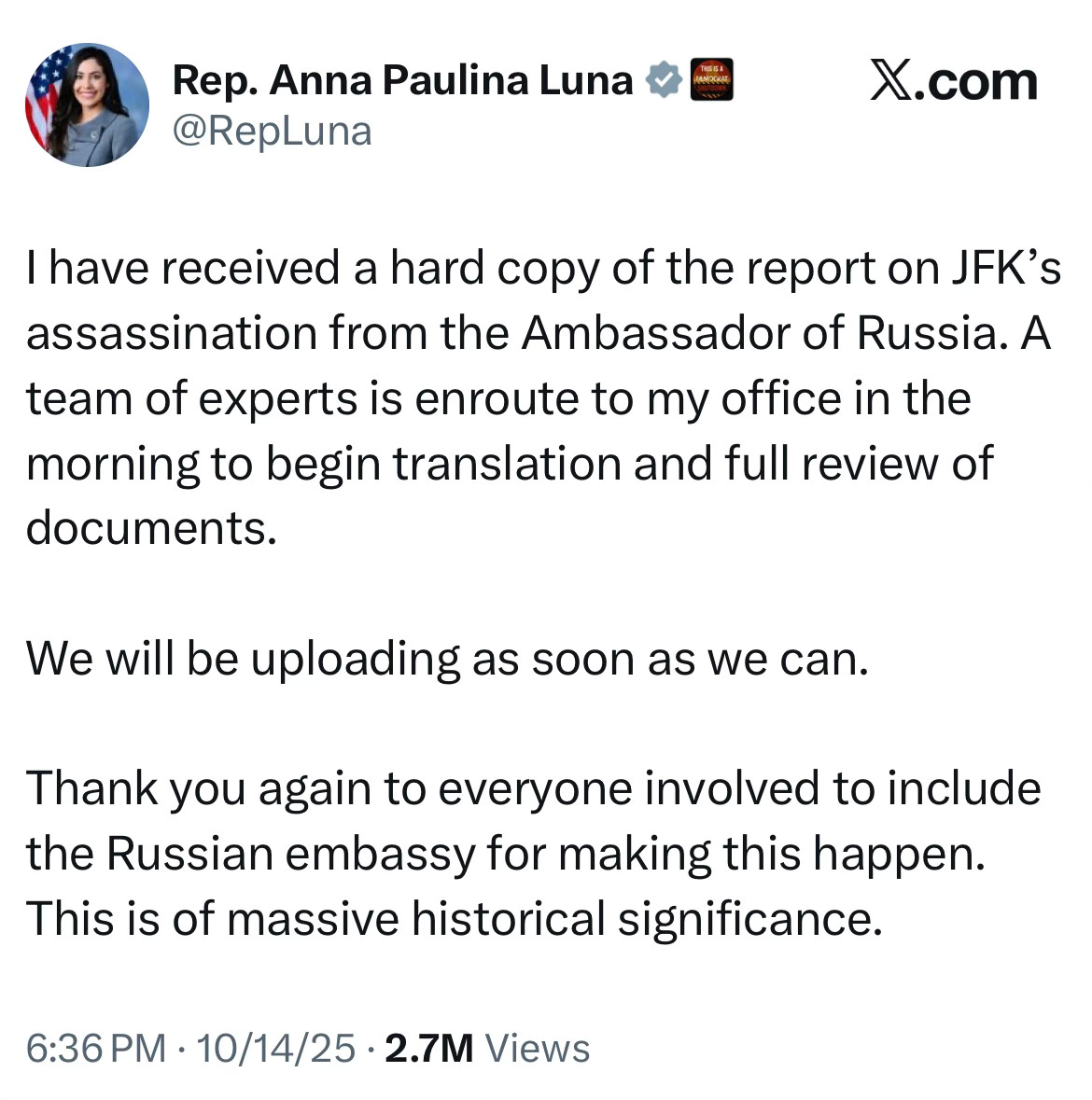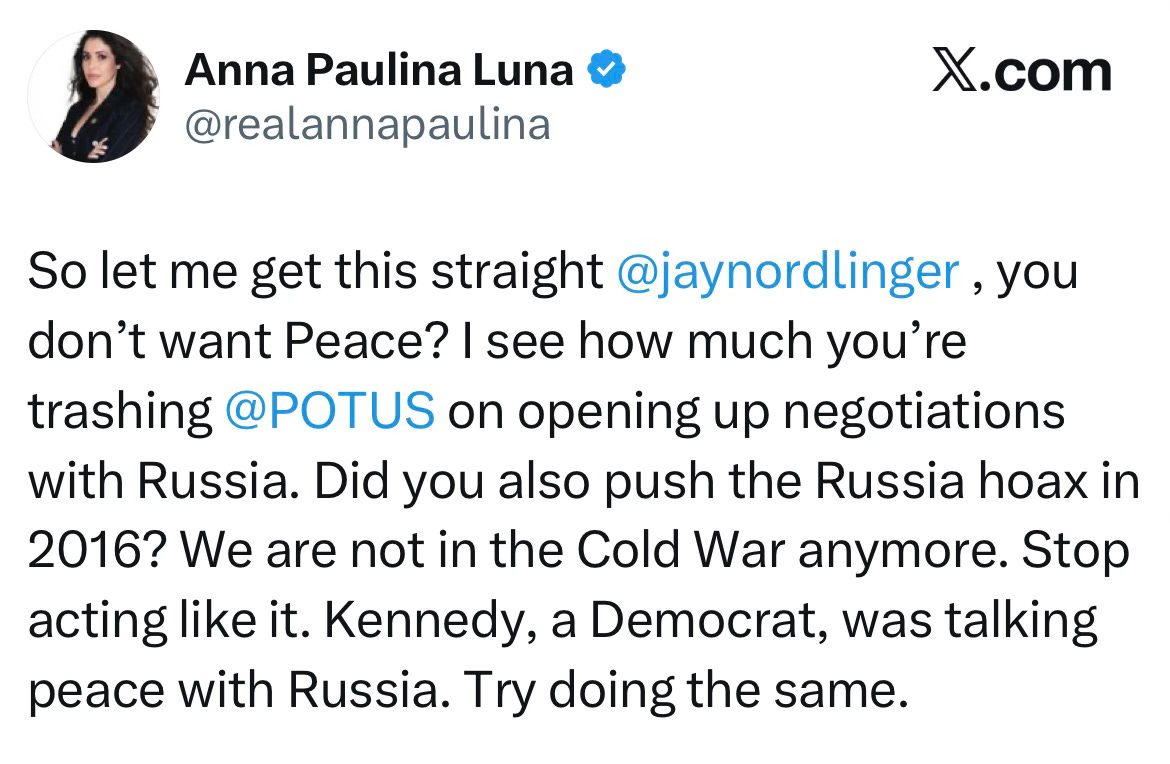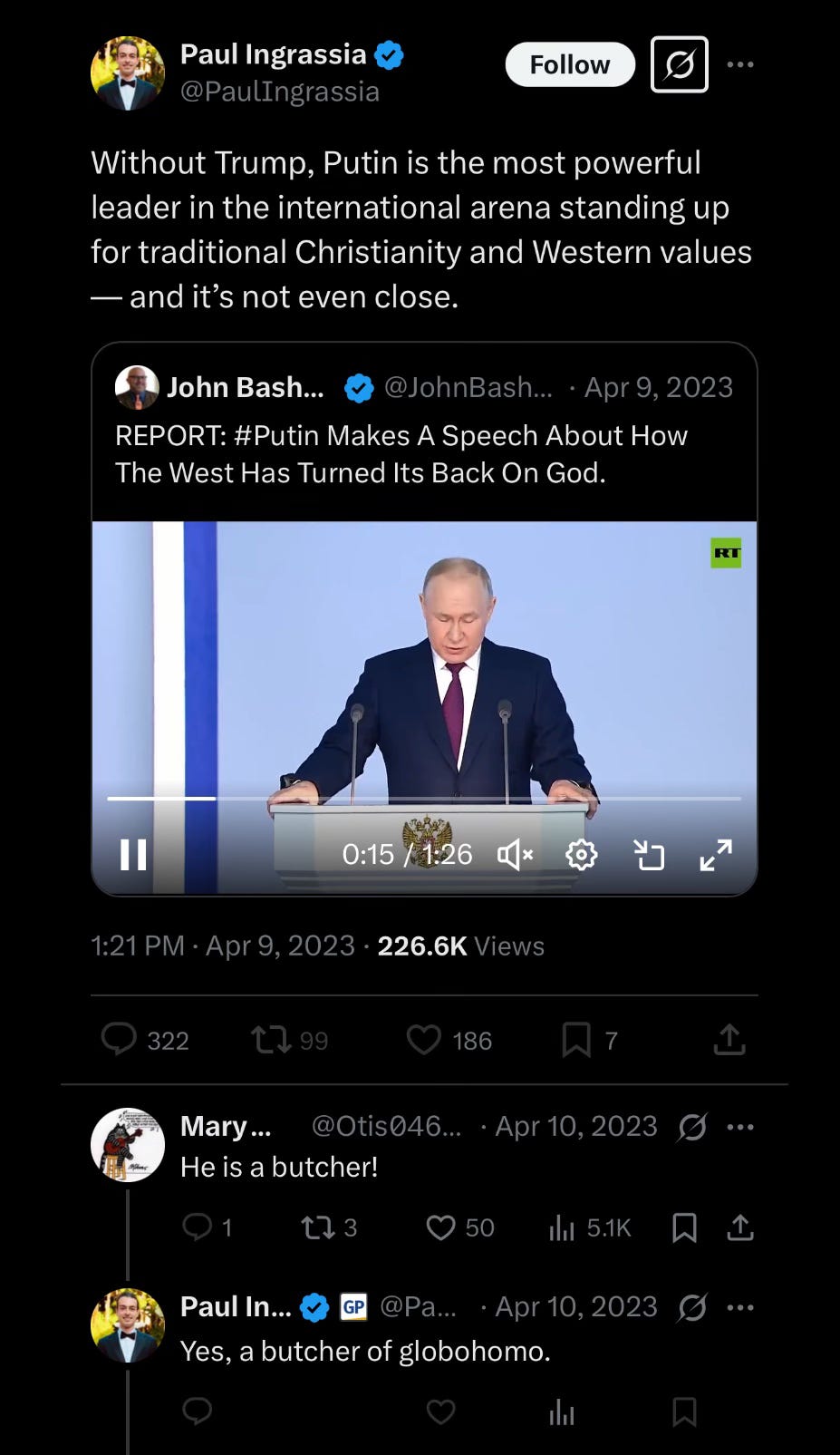‘You Don’t Want Peace?’
A reply to Congresswoman Anna Paulina Luna (R., Fla.)

This morning, I had a question from a congresswoman, on X: “you don’t want Peace?” That congresswoman is a Florida Republican, Anna Paulina Luna.
She has been in Congress since 2023, but I think I first became aware of her two weeks ago, when she posted this:
The Kremlin is hardly a trustworthy source. These guys are masters of disinformation. They have been practicing it since 1923, when an office was set up for that purpose. I have written about this subject many times, for example in this article (2020).
It is important not to be naïve in these matters. Say what you will about Republicans before 2016, they (we) were not naïve about the Kremlin. Sure, Putin had his sympathizers among Republicans: Congressman Dana Rohrabacher was a flagrant example. But, for the most part, Republicans were sober.
Congresswoman Luna has now met with a Putin envoy, Kirill Dmitriev. She put out a video of herself with Dmitriev, using some background music: the Beatles’ “Here Comes the Sun.”
Above this video, she wrote, “Peace is always the best foreign policy.” My comment was:
I wrote a book called “Peace, They Say” (a history of the Nobel Peace Prize). When people say “peace,” try to ascertain what they mean. If you want to know the nature of the Russian government—ask the Ukrainians, among others.
The journalist Michael Weiss showed a picture of Luna receiving a book from Dmitriev: Great Words of a Great Man. That man would, of course, be Putin. The congresswoman looked pretty pleased.
For my part, I said,
In Soviet days, there were many Americans and other Westerners who were tools of the Kremlin. I would be surprised if any of them belonged to the Republican Party. And now ...
To this, the congresswoman responded as follows:
There are many things to say in response to Luna’s tweet. For years, people on the nationalist-populist right have said to me, “Don’t you know the Cold War’s over?’ I often reply, “Does Putin?”
The old KGB colonel is continuing business as usual.
But on this question of peace: I do indeed want peace. But “whose peace? Poland’s? Bulgaria’s? The peace of the grave?”
That was Margaret Thatcher speaking, during her premiership—when such nations as Poland and Bulgaria were under the boot of the Kremlin.
I have often quoted Lajos Kossuth, the 19th-century Hungarian leader: “I am a man of peace—God knows how I love peace. But I hope I shall never be such a coward as to mistake oppression for peace.”
Vladimir Putin is not interested in peace. He is interested in power and control. In conquest and subjugation. To the extent he takes part in “peace” negotiations, it is to further his ends.
My book Peace, They Say is a history of the Nobel Peace Prize, as I noted in that tweet, quoted above. But it is also a book-long meditation on peace. (John Bolton pointed this out in his review of the book, which I appreciated.)
Maybe I could offer you an essay, drawn from that book: here. It is an essay on peace. It can serve as my reply—my true and full reply—to Congresswoman Luna.
I quote Javier Pérez de Cuéllar, who in 1988 said the following:
“ ‘Peace’ is an easy word to say in any language. As secretary-general of the United Nations, I hear it so frequently from so many different mouths and different sources that it sometimes seems to me to be a general incantation more or less deprived of practical meaning.
The Soviets were very, very big on peace—or rather, “peace.” Here is an excerpt from my essay:
If Western countries called themselves “freedom-loving nations,” the Soviets referred to themselves and their bloc as “peace-loving nations.” Touché! The World Peace Council was one of the most prominent Communist fronts. The Soviets named their space station “Mir,” meaning Peace (and also World). What the Americans had was Space Station Freedom ...
In 1949, Stalin or the Soviet government—was there a difference?—created the Stalin Peace Prize, more formally the International Stalin Prize for Strengthening Peace among Peoples. This was the Kremlin’s answer to the Nobel Peace Prize.
Yes. Allow me to give you some more:
As the Cold War progressed, few wanted to be seen as a disturber of the peace. If you brought up human rights behind the Iron Curtain, you might have been met with, “Do you want to start a war? Won’t you give peace a chance?” That was a great slogan of the time: “Give peace a chance.” In the 1970s and ’80s, if you made noises about human rights, you might have been met with another slogan, or very common phrase: “poisoning the atmosphere of détente.” You were “poisoning the atmosphere of détente.” President Reagan was the poisoner-in-chief: an enemy of peace, many thought, or at least an obstacle to it.
Conservatives were regularly called “warmongers”—by the Left. For example, Gore Vidal said that William F. Buckley Jr. was “the leading warmonger in the United States.” In recent years, we conservatives have been called “warmongers” by the nationalist-populist Right. John Bolton was denounced as a “warmonger” by the Republican National Committee.
Everything is topsy-turvy. Indeed, I wrote an essay last year titled “Our Political World, Topsy-Turvy.” (Subheading: “The Right today often sounds like the Left of yore.”)
Anna Paulina Luna wants the United States out of NATO. So do other Republicans. Here is Darren Beattie, a State Department official:
Here is Beattie again:
Lloyd Austin is the retired U.S. Army general who was our secretary of defense.
Steve Witkoff regards Putin as a “great leader.” Witkoff is President Trump’s envoy to Russia (and elsewhere). He has fawned over Putin nauseatingly, as I have detailed in several articles (this one, for example).
I am reminded of Joseph Davies, the U.S. ambassador to Moscow during the Great Terror. Wrote Davies,
He gives the impression of a strong mind which is composed and wise. His brown eye is exceedingly kindly and gentle. A child would like to sit in his lap, and a dog would sidle up to him.
Our ambassador was talking about Josef Stalin.
Paul Ingrassia is another Trump aide. He is the White House liaison to the Department of Homeland Security. Here is a flavor of the man:
One could go on—to talk about Tulsi Gabbard (the director of national intelligence) and many another Republican.
In 2003, Mona Charen wrote a book called “Useful Idiots: How Liberals Got It Wrong in the Cold War and Still Blame America First.” Said Bill Buckley,
I prayed that such a book would be written but doubted anything so wonderfully readable and instructive at the same time would come along. But here is Mona Charen’s great explication of the central conflict of our times.
Mona and I have often said: She, or someone else, will have to write an update, but dealing with the useful idiocy of the Right, so much like its predecessor.
Ukrainians, Poles, Balts, and others keep telling us: There is nothing peaceful about Russian occupation. This occupation is violent, murderous, and depraved.
Three years ago, I interviewed Oleksandra Matviichuk, who directs the Center for Civil Liberties in Kyiv. That year, the center shared the Nobel Peace Prize (with the Memorial society, from Russia, and Ales Bialiatski, the Belarusian political prisoner).
Matviichuk stresses that Ukraine is not fighting so much to retain territories—although those territories are rightfully Ukrainian—as for the people in those territories. To leave them to Russian occupation would be unconscionable.
(For our interview, go here.)
In its effort to crush Ukraine, Russia is joined by China, Iran, North Korea, Cuba, etc.—the worst and most aggressive dictatorships in the world. To suppose that this crowd wants peace is absurd.
These days, I have to tell Republicans what I have long told leftists, when they have accused me of loving war and despising peace: If I had my way, there would be no militaries. No nukes. No tanks.
No police departments. No locks on doors.
But I don’t get my way. We must deal with the world as it is. About Putin—and expansionist tyrants in general—be wise.








MacArthur in his 1962 farewell speech at West Point famously used, "Only the dead know an end to war."
This is excellent. Mr. Nordlinger. I have wondered, where is the disconnect? That time when the anti-Soviet Republicans became the anti-anti Putin Republicans? Was it a specific event? A chain of events, that caused heretofore realists to become pro-Russia fantasists? Even dictator worshipers? I want to believe that it was more than just Trump, who is a lousy excuse for anything.